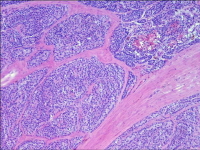Parathyroid Cancer
Introduction
Parathyroid carcinoma is a rare malignancy of the parathyroid glands. These tumors usually secrete parathyroid hormone, thereby producing hyperparathyroidism, which is usually severe. Parathyroid carcinoma may be suspected, but it usually cannot be confirmed prior to operation. This complicates the treatment strategy.

Photomicrograph of parathyroid carcinoma showing typical fibrotic septae. Histologic diagnosis can be difficult.
Pathophysiology
Parathyroid carcinomas cause hyperparathyroidism (for a more complete discussion see Hyperparathyroidism). Hyperparathyroidism is caused by overproduction of parathyroid hormone. In most cases, hyperparathyroidism is caused by a single benign adenoma (approximately 85%). The vast majority of the remaining cases are caused by parathyroid hyperplasia or multiple adenomas. In less than 1% of cases of hyperparathyroidism, the etiology is parathyroid carcinoma.
The hyperparathyroidism seen in parathyroid carcinoma is usually severe, with high serum calcium levels, severe bone disease, and renal stones. Rarely, parathyroid cancer can be nonfunctional, that is, it may cause a tumor but not produce parathyroid hormone and the sequelae of hyperparathyroidism. Overproduction of authentic parathyroid hormone from nonparathyroid sources is extremely rare but has been reported. Modern assays for parathyroid hormone measure the intact, authentic molecule and do not detect similar molecules produced by other tumors. Therefore, an elevated parathyroid hormone level is virtually always parathyroid in origin.
Untreated, parathyroid carcinoma leads to severe symptoms of hyperparathyroidism and may cause renal stones, nephrocalcinosis, pathologic fractures, and neuropsychiatric symptoms. The diagnosis is often not made prior to parathyroidectomy. This results in inadequate tumor excision and a propensity to local recurrence. Regional lymph node and distant metastases are usually not present at initial diagnosis. Recurrences may be treated by local excision or ablative treatments such as radiofrequency ablation. Death is usually caused by medically refractory hypercalcemia and seldom tumor burden alone.
Frequency United States
Parathyroid cancer occurs in less than 1% of all cases of hyperparathyroidism
International
A slightly higher prevalence has been reported from referral centers in Japan and Italy.
Mortality/Morbidity
- Survival has varied widely in the literature, with 5-year survival ranging from 20-85% and 10-year survival from approximately 15-80%The best data come from the National Cancer Data Base. In this series, 5-year survival was 88.5% and 10-year survival was 49.1%.
- A significant number of patients continue to die of recurrent disease many years after the initial treatment.
- Permanent cure is achieved in the minority of patients.
Race
No known racial predilection exists.
Sex
Parathyroid cancer occurs equally in males and females.
Age
Parathyroid cancer usually occurs in patients older than 30 years. After that, no predominant age association has been noted.
Clinical
HistoryThe history should focus on symptoms of hypercalcemia plus the other symptoms of hyperparathyroidism. The onset is usually more abrupt, and the symptoms more severe than hyperparathyroidism due to benign disease.
- Bone pain, pathologic fracture, or other evidence of bone disease (approximately 90% of patients)
- Renal stones (50-80% of patients)
- Symptoms of hypercalcemia - Fatigue, weakness, confusion, depression, constipation
Physical
- Palpable mass in the neck (approximately 50% of patients)
- A palpable mass is virtually never present with benign parathyroid adenomas or hyperplasia.
- If a mass is palpated, parathyroid carcinoma should be suspected.
- Signs of hypercalcemia
Causes
The etiology is unknown in most cases. Parathyroid cancer may be associated with the genetic disease hyperparathyroidism jaw tumor syndrome. It also may be associated with a history of neck irradiation.





































